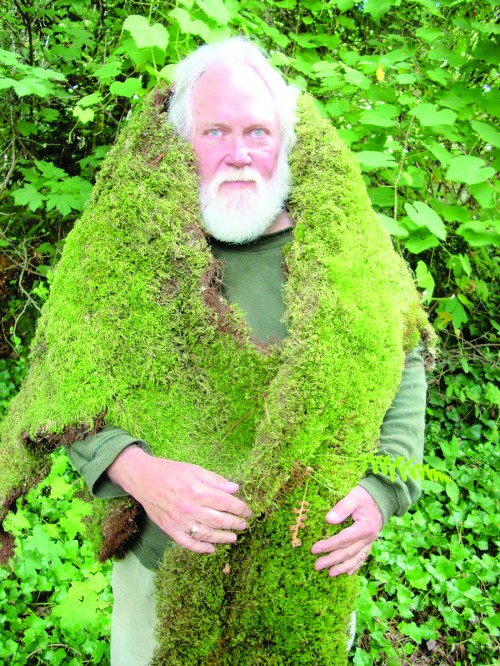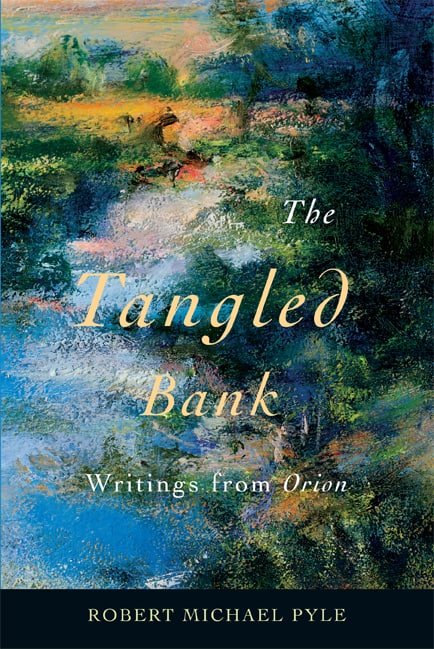Exploring "The Tangled Bank" with Robert Michael Pyle

North Cascades Institute welcomes Robert Michael Pyle to Village Books in Bellingham, 1200 11th St., Friday, December 7, 7 pm. Free!
Robert Michael Pyle has been interpreting the natural world for readers for more than 30 years. Combining his Yale-educated scientific background, an insatiable curiosity for the world and a warm, generous personality that inspires his prose, Pyle explores the myriad ways in which nature intersects with our daily lives.
A long-time resident of Gray’s River in southwestern Washington, Pyle’s published work—which includes books on the natural history of the Willapa Hills, Bigfoot, butterflies, Vladimir Nabokov and his childhood in Colorado— has been recognized with two Washington State Book Awards, a National Outdoor Book Award, a Guggenheim Fellowship and the John Burroughs Medal for Distinguished Nature Writing.
His latest book The Tangled Bank collects dozens of his columns from when he was a regular contributor to Orion and Orion Afield magazines. Each personable piece is a finely honed mini-essay, weaving together natural history, philosophical ruminations, travelogue, scientific facts, poetic observations and commentary on contemporary culture.

Christian Martin: Your column “The Tangled Bank” was published in 52 consecutive issues of Orion over 11 years. What were the challenges in writing such a long-standing feature with a strict format?
Robert Michael Pyle: The biggest challenge was to learn to write concisely (750–1300 words, depending on the issue) and still write substantively, not lite, shallow or “sound-bitey.” I did enjoy it, and continue to value and employ the heavy apprenticeship in concision that it represented. But it was invariably difficult, sometimes wrenchingly so, to meet the inflexible word counts and the incessant deadlines. It seemed that no matter how long and how many drafts a column took to finish, there was always the next one due on its heels. But that’s good, too, to keep you going.
CM: How did you come up with enough topics to sustain the column?
RMP: I wrote about what most fascinated me at the time. Since I am always fascinated with something, or many things, and since my travels constantly suggest new topics, it wasn’t difficult. The greater difficulty was deciding among the many possible topics. This collection of my columns concludes with a list of 52 more I’d like to write someday, including ones on waterbears, plants that grow on animals, the evolution of empathy, recycling roadkill, the history of saffron and the ontology of crocuses and “Utopia: what to leave in, what to leave out.” I could go on.
CM: Was there a unifying theme or mission that tied together the columns over the years?
RMP: Yes, the unifying theme was Darwin’s contention that “it is interesting to contemplate a tangled bank…”—in other words, all of nature is interesting when closely observed. My mission was to demonstrate that the world is never boring. And, I suppose you could say, to dive as deeply as I could in one breath.
CM: It is very unusual to find natural history writing, as exemplified in these columns, in publications today, don’t you think?
RMP: Yes, such writing is rare, especially with a bit of wit, which I employed when appropriate. One does see good natural history writing here and there in serials, such as Tom Titus’s fine essays in the newsletter of the Eugene Natural History Society and Rod Crawford’s columns on spider collecting expeditions in Scarabogram. But not a lot. Maybe there are lots of good naturalists’ blogs, but since I don’t tend to read online, I don’t see them. I mostly go to books, both fiction and nonfiction, and of course, poetry.
Apart from the obvious candidates we both know and love, some current writers of excellent natural history (writ large and sometimes funny) that I would endorse include Ken Lamberton, David Carroll, Julia Whitty, Jim Lynch, Charles Goodrich, Bill Yake, Seth Kantner, Carl Hiasson, Barbara Kingsolver, Henry Hughes…these are people who observe the world in all its individuating detail and bring it back in ways that delight me.
CM: Your column succeeded in connecting natural history and scientific topics to contemporary life and relevant issues.
RMP: It keeps the wide world always engaging—and therefore, ever compensatory—for the unsatisfactory qualities of the narrow world of human society. Ala Robinson Jeffers, it can help you keep your mind in maddening times. It makes life, in short, more fun.
CM: What do you do to keep the arts of traditional natural history studies alive?
RMP: I go out of doors, with my eyes, ears, and mind wide open. And then, when and if I feel like it, I write about it, in letter, journal, essay, poem, or even—if nothing else—an email. Other than that, I guess my main ways of helping to keep the practice alive are the reading and writing of books informed by the physical world; and urging the young to go afield, to seek, to read, and—if they feel so moved—to write what they find.
Originally published 12/7/12 in the Cascadia Weekly.

